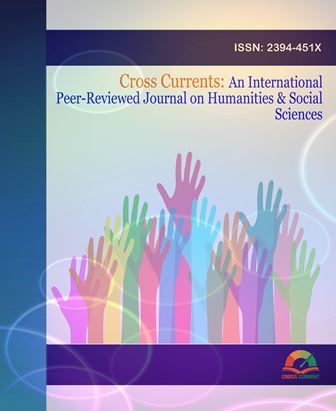+91-9365665504
+91-8724002629
submit@saspublishers.com / saspjournals@gmail.com

An International Publisher for Academic and Scientific Journals
Author Login
Cross-Currents: An International Peer-Reviewed Journal on Humanities & Social Sciences
Journal Home
Description
Editorial Board
Archives
Indexing
Statistics
Title : Cross-Currents: An International Peer-Reviewed Journal on Humanities & Social Sciences
Abbr : Cross Current Int Peer Reviewed J Human Soc Sci
ISSN (Online) : Open Access
ISSN (Print) : 2394-451X
Discipline : Humanities & Social Sciences
Frequency : Monthly
Country : India
Language : English
Abbr : Cross Current Int Peer Reviewed J Human Soc Sci
ISSN (Online) : Open Access
ISSN (Print) : 2394-451X
Discipline : Humanities & Social Sciences
Frequency : Monthly
Country : India
Language : English
10.36344
DOI
DOI
3.1
IMPACT FACTOR
IMPACT FACTOR
Current Issue : Volume-12 - Issue-01 ; 2026
Recently Published Articles
Jan. 27, 2026 | Original Research Article
Student Mental Health and Academic Outcomes: A Study in Higher Education Institutions
Ivy S. Diaz, EdD, Robert E. Wariza, Jr., MST, Ma. Raniella Ardiente, Janeth M. Wariza
Cross Current Int Peer Reviewed J Human Soc Sci | 10-30
DOI : https://doi.org/10.36344/ccijhss.2026.v12i01.002
Jan. 22, 2026 | Original Research Article
Trends, Structural Break and Factors of Gender Gap in Labour Force Participation in India
Zoya Fatema, Susobhan Maiti
Cross Current Int Peer Reviewed J Human Soc Sci | 1-9
DOI : https://doi.org/10.36344/ccijhss.2026.v12i01.001
Dec. 3, 2025 | Original Research Article
National-Scale Land Use Transitions in Nigeria: Patterns, Rates, and Implications for Sustainable Landscape Management
Oboh S. Okosun
Cross Current Int Peer Reviewed J Human Soc Sci | 243-258
DOI : https://doi.org/10.36344/ccijhss.2025.v11i12.001





